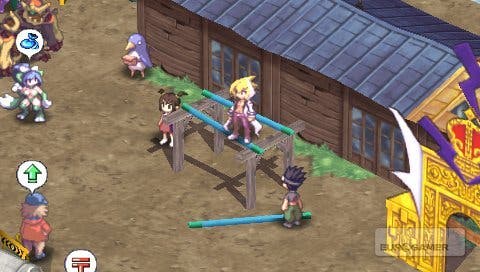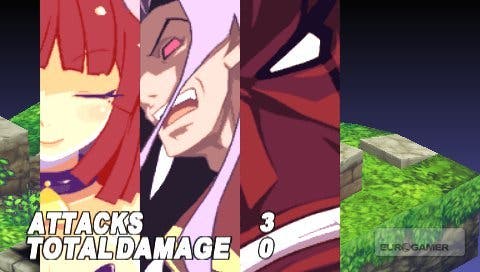Disgaea 2: Dark Hero Days
The sun's gone dim?
The pressure to reinvent is the curse of every one-time maverick. Find success in tearing up the rulebook with bold originality and it's only too easy to merely iterate on that first idea or innovation for the rest of your life. So the idea becomes a series, becomes a franchise, becomes an institution. And the young, brash innovator finds herself head of a new establishment, replacing that which she came to undermine.
So it is with Nippon Ichi, the diminutive Japanese developer who in 2003 reinvented the strategy RPG with Disgaea. The game's irreverent approach to both narrative and mechanics took apart the genre's stagnating, Chess-like elements and put them back together as something at once fresh and familiar.
And while Nippon Ichi's unconventional approach has continued to be expressed in new IP, its flagship Disgaea series has shifted only in subtle ways across its trilogy. Now, as the developer ports each title to handheld formats, it's that much harder to search out the nonconformist heartbeat that gave life to the first game.
All of which is not to say that a handheld version of this sequel is unwelcome. Few games suit portable play so well as Disgaea, which can be savoured equally in nibbles or gulps of time. And the ability to dip in and out of a particularly tricky stage with a flick of the on/off switch makes the journey through the game immediate and smooth, even it's a staccato rhythm.

Moreover, Nippon Ichi has lifted a number of the new character classes and systems found in the most recent PlayStation 3 title and reinserted them into this older game, changes that ensue this is undeniably the definitive version of Disgaea 2.
However, it's hard to shake a sense of re-release ennui. Disgaea games aren't taken on lightly and, for those who have plunged into the time-sapping depths of three distinct yet similar titles now, no amount of tweak and polish can freshen the formula. This isn't helped by the fact that Disgaea 2's story is the weakest of the trilogy, lacking the style and pizzazz of the first game, which remains the series highpoint. In both the first and third games, you play as an anti-hero, a likeable Netherworld dweller whose moral vacuity plays off the traditionally conscientious RPG plotlines to great comedic effect.
In Disgaea 2 you play as Adell, a typically upright Japanese RPG protagonist on a quest, not to save a princess from a castle, but to return her. Her father, the Evil Overlord Zenon, has turned Adell's town, which forms the hub of the game, into a netherworld and its inhabitants into monsters. Rozalin, the Dark Lord's daughter, summoned to the village by mistake, agrees to convince her father to reverse his spell, if Adell can return her home safely.

While the premise gently turns convention on its head, in the context of Nippon Ichi's irreverent world-building playing as a good guy simply isn't as fun as playing as a hapless demon. Numerous PSP-exclusive cameos from characters from the first game including Etna, Fallen Angle Flonne and, of course, Laharl only reveal how memorable the original cast is by comparison.
The plot isn't helped by a weak translation that fails to inspire as Atlus' sterling work in the first game did. All of the typos or awkward syntax from the PS2 game have carried over to this port, a curious oversight considering the amount of effort that has gone into recoding elements of the mechnics. There are still good lines to be found in the drama, but the humour evidently present in the Japanese original strains against its translation.








